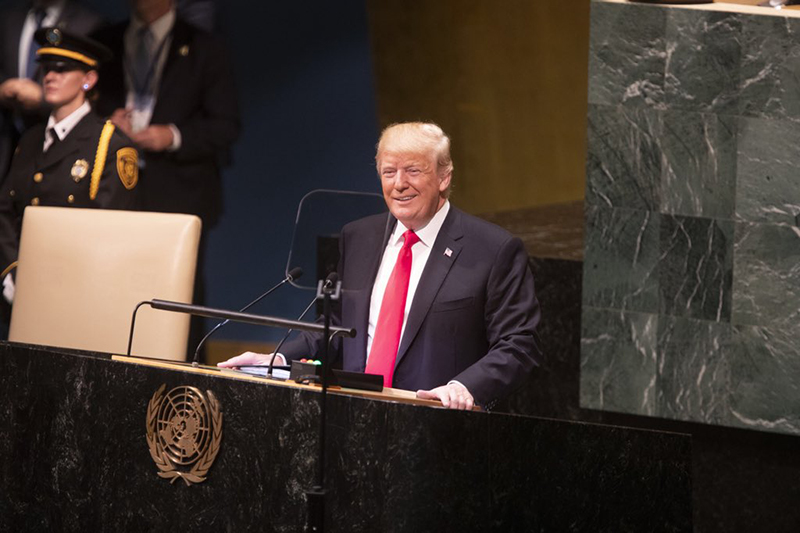
UNITED NATIONS, N.Y. — U.S. President Donald Trump let Canada know how he really feels Wednesday — sharpening his tariff threat, calling out Chrystia Freeland and claiming he denied Justin Trudeau a bilateral meeting, all because of the federal government’s hard bargaining on North American trade.
Trump made the comments late Wednesday during a free-wheeling news conference at the end of his two days at the United Nations General Assembly. He was asked if he had denied Trudeau a request for face time while the two leaders were at the UN.
“Yeah, I did,” Trump said. “His tariffs are too high and he doesn’t seem to want to move. And I’ve told him, ‘Forget about it.”‘
But the president wasn’t done.
He then reiterated his threat to slap punitive tariffs on Canadian auto imports to the U.S., a both-barrels tactic experts on either side of the border have warned would devastate the industry.
“Frankly, we’re thinking about just taxing cars coming in from Canada,” Trump said. “That’s the motherlode, that’s the big one. We’re very unhappy with the negotiations and the negotiating style of Canada.”
And then, for good measure: “We don’t like their representative very much.”
That appeared to be a reference to Foreign Affairs Minister Chrystia Freeland, a former journalist and careful tactician whose star turn in Trudeau’s government has earned her deep respect in the Liberal caucus and beyond.
Officials in the Prime Minister’s Office disputed the president’s statement — insisting for the second time this week that they did not request a meeting and declining further comment.
It wasn’t immediately clear whether Trump was responding to comments Trudeau made earlier at a news conference of his own — similar to what happened over the summer following the G7 meetings in Quebec.
Trump had already left Charlevoix and Trudeau was giving a seemingly benign defence of Canadian interests at a post-summit news conference when the president suddenly erupted into a bitter Twitter tirade from the confines of an airborne Air Force One.
The two leaders have spent little time together since, suggesting that the G7 gathering was a turning point in one of the most important high-level diplomatic relationships in the world.
Earlier Wednesday, Trudeau appeared to give a gentle nudge to the president’s trade ambassador, saying Trump had insisted repeatedly that punitive American tariffs on steel and aluminum wouldn’t be an issue under a new NAFTA.
Trump has said “a few times” that a new deal would mitigate the tariff issue, the prime minister said.
“We are continuing to work on getting to a right deal for Canada, a right deal for Canadians. And that involves, obviously, feeling confident about the path forward as we move forward — if we do — on a NAFTA 2.0 and the … lack of punitive tariffs that we consider are unjust,” Trudeau said.
The pressure, of course, is mounting.
Congress, wary of upcoming midterms that are widely expected to inject more Democrats into the current power balance on Capitol Hill, is agitating for Canada to join an existing U.S.-Mexico deal before a self-imposed deadline of Sunday.
Observers say the patience of U.S. lawmakers is waning, particularly with a good deal with Mexico on the table. Supporters of Mexico’s incoming government, which takes office Dec. 1, are not especially fond of NAFTA, which is why both countries want the deal done before then.
Trudeau’s interactions with the mercurial U.S. president have been a subject of great curiosity over the course of his three days at the General Assembly.
First, there were the comments from U.S. national security adviser John Bolton, who suggested Monday that requests for a bilateral meeting “couldn’t be accommodated.” Officials in the Prime Minister’s Office insisted no such request had been made, given already close contact with the White House.
The next day, what appeared to be a brusque encounter between the two leaders — Trump appeared to ignore the prime minister at a UN luncheon until Trudeau tapped him on the shoulder, only to shake hands with a still-seated president — sent tongues wagging.
The prime minister insisted it was just an innocent exchange — a notion that was all but in tatters by the time Trump took to the podium, where he felt compelled to add his standard countervailing compliment.
“I love Canada, by the way,” he said. “I have so many friends … but that has nothing to do with this.”